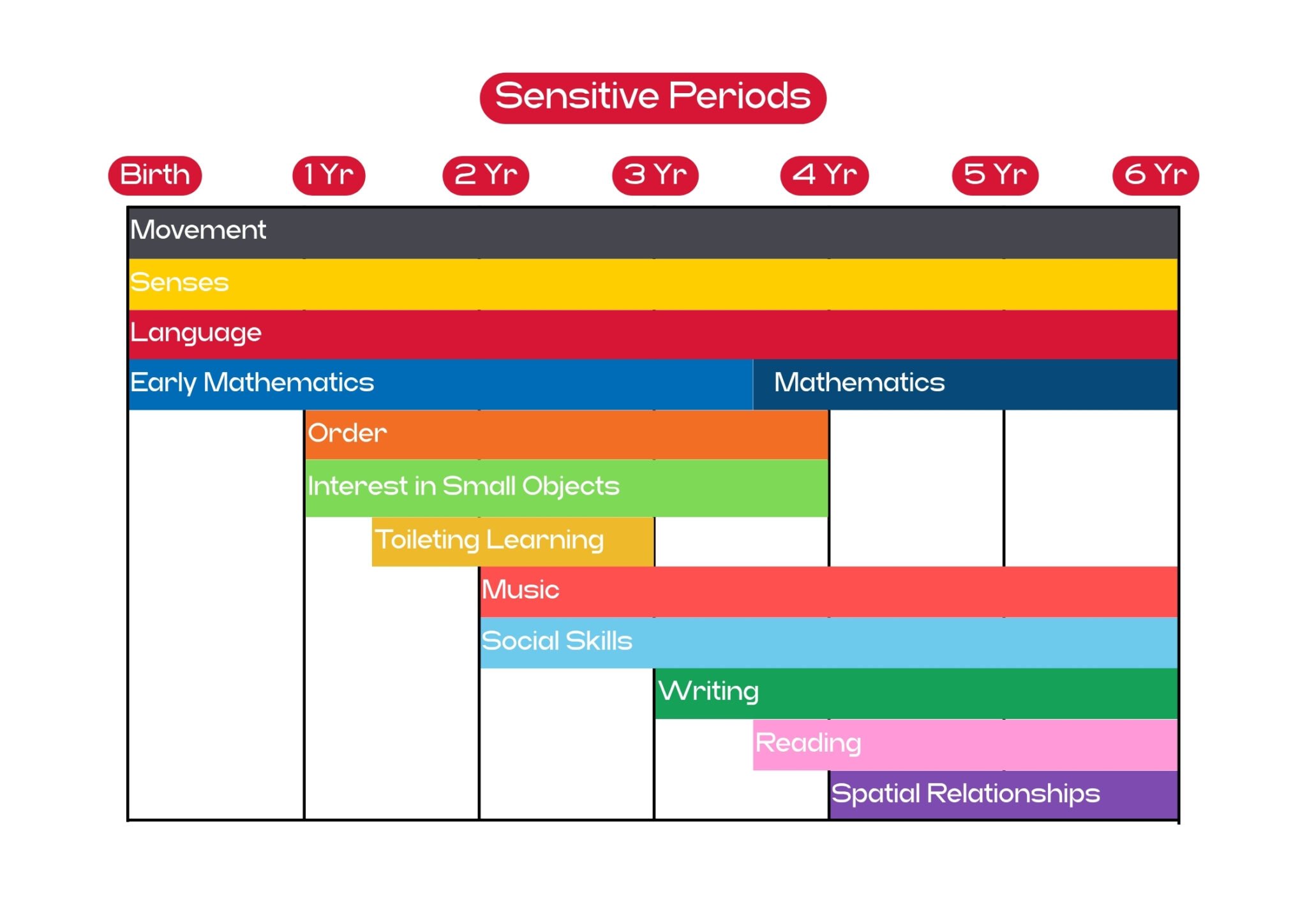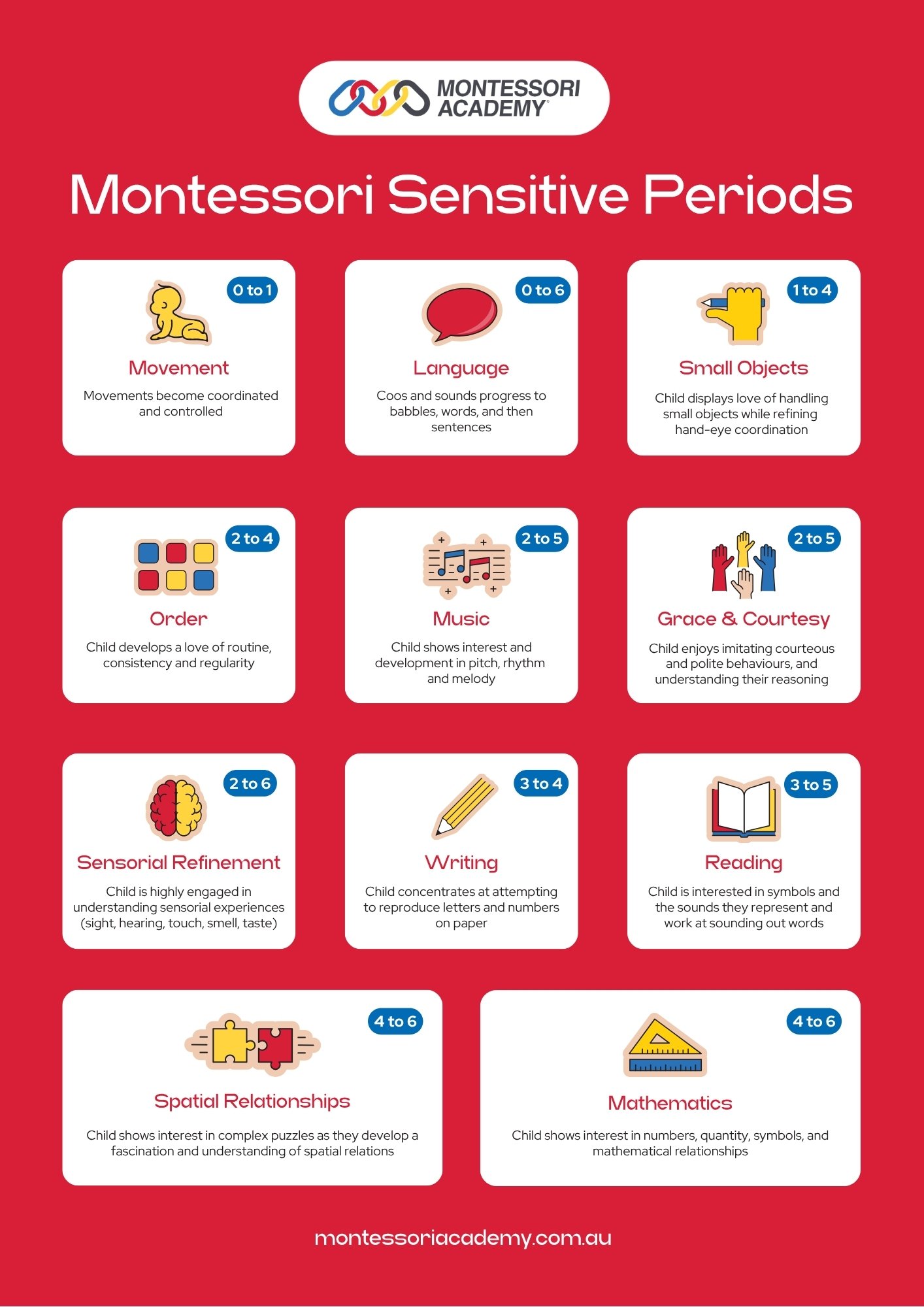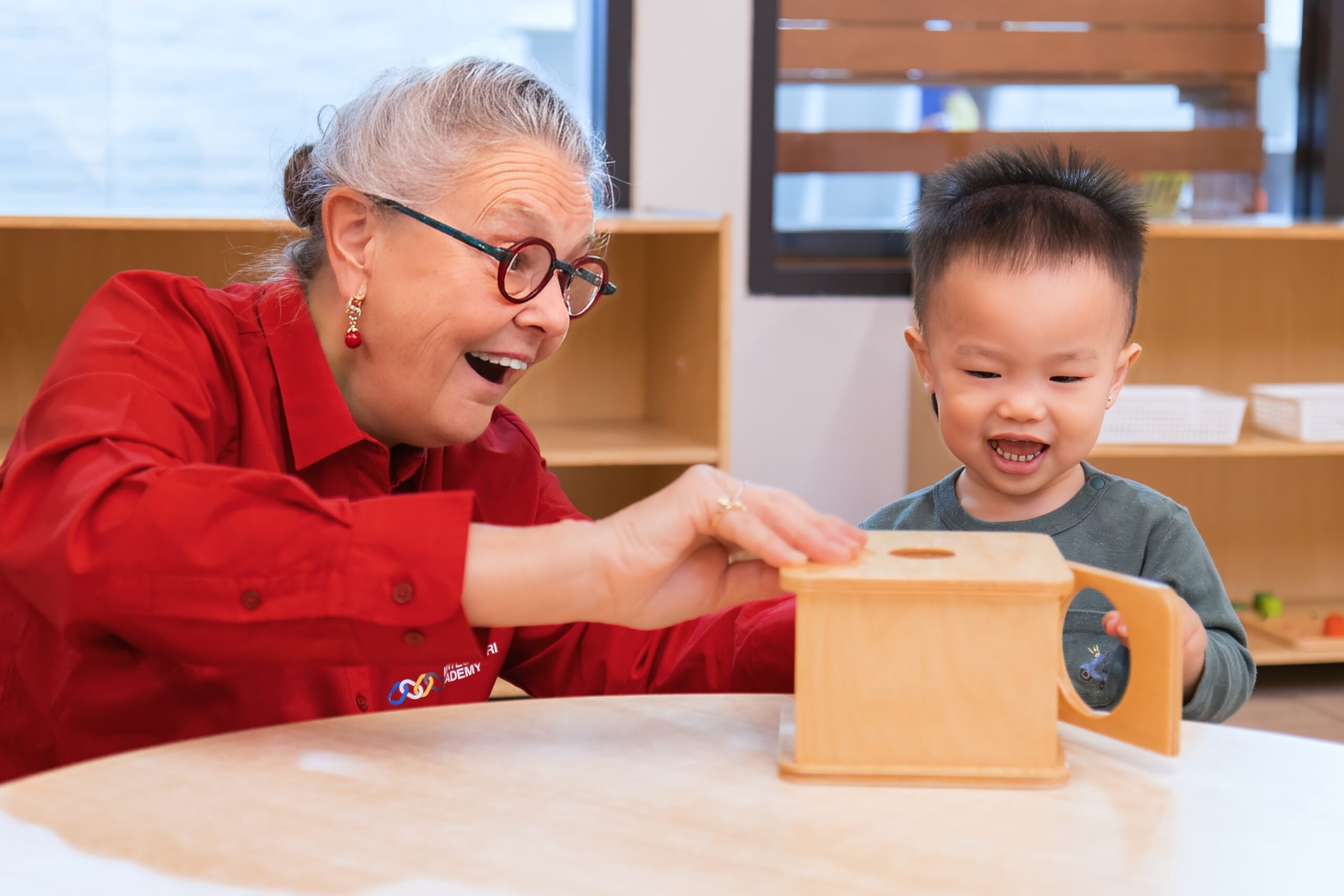Imagine a education program that’s designed to support your child’s developmental milestones and stages. An early learning environment where educators guide your child not to ‘play house’ but to foster their interests, learn how to follow routines, and develop true skills and independence.
You might think, ‘Oh they’re too young for anything but playing with a box of toys’.
But that’s not the case at all, says Zac Zachar, Montessori trainer and culture specialist. “We know that 80 percent of a child’s brain is developed by 3 years old – and 90 percent by age 5,” she says. “And it’s during these years that children develop linguistic, cognitive, social, emotional and regulatory skills that predict their later functioning in many areas – all prior to starting school!”
What Are the Stages of Child Development?
We can categorise child development into infancy, toddlerhood, preschool years, and early school years, spanning from 0-6 years.
In Montessori education, we talk about the four distinct stages or developmental ‘planes’, which stretch from birth until adulthood. The first developmental plane, or stage of cognitive development, starts at birth and continues until your child turns six.
“This plane of development is broken into two phases: 0-3, when you’ve got these little beings observing, absorbing and watching everything in what we call a period of construction,” explains Zac.
“They’re taking in all the information from their environment like a sponge. And around age 3, that unconscious, absorbent mind becomes conscious, and they begin to consolidate what they’ve learned and apply a sense of order to their learning. Essentially, they’re constructing themselves for life – it’s like a growth blueprint.”
What Do the Different Stages in Child Development Look Like?
Here’s a quick snapshot of stages of development and what’s happening for your child at every age from birth until six.
| Age Group | Stage of Development | Key Characteristics | Focus of Development |
| 0–2 | Infancy – exploring with the senses | Babies are focused on learning through movement and sensory experiences, and the absorbent mind is at work too, with rapid physical and brain development happening. Forming attachments and trust is also key right now. | – Gross and fine motor skills – Building trust with caregivers – Exploring cause and effect |
| 2–3 | Toddlerhood: Beginning of Autonomy | Any parent of a toddler will know there’s a big push for independence around this time. Early self-awareness is happening too, along with simple social interactions. | – Self-control and autonomy – Experimenting with choices – Language explosion and self-expression |
| 3–5 | Preschool years: Imagination and Social Expansion | Imaginative pretend play, deeper interactions with other kids and beginning to understand rules and roles is key for this age group. | – Refining motor coordination – Early moral sense and empathy – Cognitive leaps through play and questioning |
| 5–6 | Early School Years: Consolidation and Readiness | Children aged 5-6 are preparing for or starting school, and developing their sense of identity. They’re also learning more about logical thinking and increased cooperation and fairness. | – Preparing for structured learning – Responsibility and persistence – Strengthening language, pre-literacy, and numeracy skills |
The table above is a quick glance guide to what, in Montessori, we call the first plane of development. “It lays the foundation for a child’s future learning,” says Zac. “We say that Montessori education is a preparation for life, and skills needed for a smooth transition to school are greater than simply academic preparation. There is a very strong academic aspect to Montessori, but the foundation is the practical life area.”
What Are Developmental Milestones for a Child?
Developmental milestones are the skills and behaviours expected to happen at certain ages, such as sitting, crawling, walking and talking. Milestones also include progress in social, emotional, and cognitive skills like smiling, playing, problem-solving, and following directions.
However, it’s important to recognise that every child reaches milestones at a different pace. The EYLF wants parents and educators to view the milestones as a source of information rather than a prescriptive checklist.
Below is a table outlining some of the more common developmental milestones from birth to six years old. For a more definitive list, please check out Developmental Milestones and the EYLF/NQS.
| Age Group | Physical | Social | Emotional | Cognitive | Language |
| 0–2 years | – Rolls over, sits, crawls, walks – Begins to climb (between 1-2 years) – Grasps objects and uses pincer grip | – Smiles and laughs – Recognises familiar people – Curious / energetic – Begins parallel play near other children | – Seeks comfort when upset/afraid – May fret when parent leaves room – – May lose control when frustrated/tired | – Explores world through senses – Enjoys games like peek-a-boo – Begins simple problem-solving | – Cries, coos, babbles – By 12 months starts to say first words (i.e. mama, dada) – Can use 2-word phrases by age 2 |
| 2–3 years | – Runs, jumps, starts to climb stairs one at a time – Fine motor tasks (drawing circles gets dressed with help) | – Enjoys simple group play with other children – May protest at sharing toys with other kids – Engages in simple make-believe play | – Shows defiant behaviours – Begins to express basic emotions (happy, sad, mad, guilt or remorse) | – Builds tower of 5-7 objects – Plays with sand, water, dough – Follows simple 2-step directions | – Copies words and actions – Uses 2–3 word sentences – Likes listening to stories and books |
| 3–5 years | – Hops, skips, balances briefly – Can navigate playground with increasing agility – Can dress with a little help | – Engages in cooperative play – Makes friends, may have a particular friend – Develops independence and social skills | – Begins to manage emotions – Comforts someone who is hurt – May be aggressive to peers | – Can count 5-10 things, recognize some letters – Follows simple instructions – Solves simple puzzles | – Speaks in full sentences – Asks many questions – Tells simple stories, uses future tense |
| 5–6 years | – Skips, climbs, runs smoothly – Uses scissors, writes some letters and numbers – Gains coordination for sports | – More peer-oriented – Plays games with rules – Forms closer friendships | – Greater self-control – Expresses a wider range of feelings – Begins to understand fairness | – Recognizes letters and numbers consistently – Begins reading readiness – Understands time concepts (yesterday, tomorrow) | – Clear speech, 2000+ words – Uses complex sentences – Can describe events in sequence |
What Are Sensitive Periods?
Where developmental milestones are general, broader indicators of what children may do at certain points of development, sensitive periods are slightly different, says Zac.
“Sensitive periods are special windows of opportunity in the stages of child development and focused on specific skills that are coming from within the child themselves. It’s a booming desire to master something, and it varies from child to child.”
During these times, a child is particularly open to developing a particular skill. “If you can work with the child’s sensitive period and interest, that’s when they’ll work on something again and again, and it’s how they begin to develop concentration, which is so incredibly important for them.”

What Does Your Child’s Sensitive Period Look Like?
If a child’s interests are fostered during a sensitive period, they’re more likely to focus on that skill over and over until they master it, says Zac.
She remembers a four-year-old boy she worked with who took a long time to engage with anything. “He did a little bit of this, a little bit of that – and one day he pulled out the 100 board. It’s a blank board with 100 tiles and I showed him how to get started then stepped back and watched. He came to the Academy three days a week and for the next two months, he worked on that board. We supported him by breaking it down and making it a little easier – but by the end of those two months, he recognised every one of those numbers himself.”
This little boy had always been very tentative but he went for his kindergarten interview shortly after this.
“I don’t know whether it was because he’d mastered the 100 board and he felt good and strong in himself, but he came back from the interview, looked at me and said, ‘Next I want to learn how to add, because I couldn’t do that at my interview today’. He had that amazing sense of, ‘I can do it. I’ve accomplished something because I’ve been given the space to accomplish it,” says Zac.
What If You Miss Your Child’s Sensitive Periods?
This is a common question parents have if their children are in a Montessori early learning environment. “What if your child misses or doesn’t receive support during a sensitive period?”
Firstly, don’t worry too much – your child can always catch up.
“However, what Dr Montessori found was that if your child is given the opportunity to develop the skill when they’re in the sensitive period, they’ll learn it more naturally, because it’s coming from an internal desire on your child’s part,” says Zac.
“You can always learn something later, but it won’t come as readily or as easily.”
Here’s a snapshot of sensitive periods. These are the ages when your child may suddenly have a strong drive to learn something new.

How Can You Support Your Child’s Montessori Learning At Home?
If your child is in a Montessori education environment, you may have been wondering – what can you do at home to support the developmental stages and milestones your child is going through?
“Every parent knows that famous quote by a three-year-old. “Let me do it myself!” And they want to learn how to do it by themselves,” says Zac. “So we’ll say to parents, don’t carry them into the centre – let them walk. Put on their backpacks. We promote the things we’re asking them to do in the classroom and encouraging parents to do them at home.”
She acknowledges that it can be a struggle, though, given parents work long hours and there isn’t a lot of time to let children do all the things. Especially in the morning when it can be a rush to get out the door.
“That said, children learn from a young age at Montessori to serve themselves at lunch, with tongs. They learn how to take their dish, scrap it into one bucket and drop it for washing in another bucket. I had a conversation with a parent who told me they had a party on the weekend. The mother told me, ‘You know, Johnny took the tray and walked around and offered food to everyone! I didn’t know he could do that!’ But there are skills kids learn at a very young age in Montessori that might surprise parents. And [as a parent], you have to trust that your child is capable and smart and can be shown how to do things.”
What Are The Misconceptions About Montessori Education?
There are two main ones, says Zac. “People think we talk about following the child, and that means that whatever the child wants to do they’re allowed to do, which is absolutely not true. It’s freedom within limits. We have a specific way of using the materials, there are guidelines, and if you mis-use it, we’re going to ask you to put it away and choose something else or we’ll show you something else. So that’s one misconception – that it’s this massive free-for-all.”
The other misconception is that Montessori education in the birth to six stages of child development is too rigid.
“That’s also not true – I think it comes from the idea that we don’t let children take any material off the shelf and use it anyway they like. And there’s a reason for that: these materials are set up for the interests of the children, and you’re helping them understand the rules and expectations of the classroom. In this period, you’re starting to develop a classroom that has a sense of order and flow and respect for one another, and everyone follows that. You’re also learning, through the use of materials, to make informed choices.”
Why Choose Montessori for Your Child’s Early Childhood Learning?
Many reasons, but ultimately, it’s a very holistic form of education that’s come from closely observing children, and developing the materials that support their interests and their independence, says Zac.
“Also, mainstream schooling is definitely more cookie-cutter and once you get into big school, it becomes very teacher-led,” she explains. “Our environments are predictable, and we know that children in this first plane of development do the best when they have that predictability. If you walk into our classroom and want to work with the red rods, you know where they are. If you walk into a typical childcare centre and they’ve set up something different everyday, how do you get a sense of where you fit in and where the order is and the predictability?”
That’s not to say that Montessori doesn’t set up different environments or encourage outdoor play or free play. However, the purpose of the Montessori classroom is to allow the child to become more comfortable in it, to lead themselves and develop their interests.
“It’s designed to encourage children to develop a love of learning, by using the materials again and again. They’re called autodidactic, or auto-instructional and if you’ve been shown how to use them and you keep practising, you’ll eventually master it,” says Zac.
The Montessori curriculum is not a yearlong program that happens just before your child goes to school. It occurs over a period of time, in keeping with the child’s development levels, she adds.
“Each step is building on what has come before.”
Early childhood is a hugely formative time for your child. Understanding the developmental milestones, child development stages and the sensitive periods of learning can only help you support your child at home during these years.
Montessori education prepares your child for a lifetime of learning, emotional wellbeing, and communication skills, while helping them build independence, navigate new environments, and learn to take turns and share.
Our educators guide your child through early childhood with materials designed for their developmental stage. If you’re considering a Montessori environment for your child, we’d love to welcome you and your family!
At Montessori Academy, we believe that early preparation creates a strong foundation for lifelong success. Through our proven approach, we guide both children and parents through this important milestone, helping learners thrive academically and socially. Contact Montessori Academy to learn more about how our approach, both before starting and during education, will help your child embrace new challenges with curiosity, resilience, and joy.
